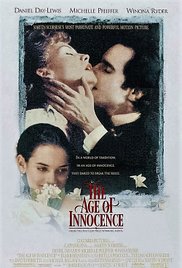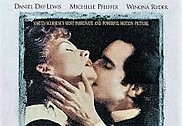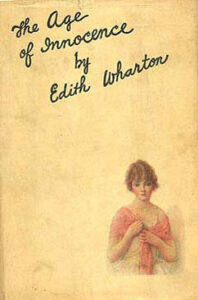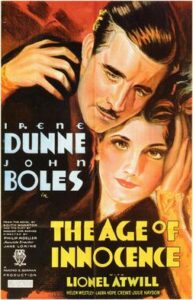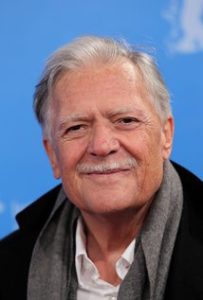The Age of Innocence *** (1993, Daniel Day-Lewis, Michelle Pfeiffer, Winona Ryder, Miriam Margolyes) – Classic Movie Review 5,280
Martin Scorsese’s reverent, faithful film of Edith Wharton’s 1920 novel The Age of Innocence follows the fortunes of society lawyer Newland Archer (Daniel Day-Lewis), engaged to May Welland (Winona Ryder) but drawn to Countess Olenska (Michelle Pfeiffer).
Director Martin Scorsese’s reverent, impeccably faithful adaptation of Edith Wharton’s 1920 Pulitzer prize-winning 19th-century-set classic novel The Age of Innocence follows the fortunes of society lawyer Newland Archer (Daniel Day-Lewis), who is engaged to pretty, well-connected May Welland (Winona Ryder) but is inexorably drawn to the Countess Ellen Olenska (Michelle Pfeiffer), a disgraced, enigmatic beauty with a failed marriage behind her.
Scorsese’s 1993 plunge into romantic period costume drama had some of the critics of the day in raptures, drawing extravagant parallels between the ritual violence of Raging Bull and the savage cut-and-thrust of New York’s high society. It is certainly a most civilised and stylish movie, with a gleaming, beautiful, antique-looking surface in the images of ace cinematographer Michael Ballhaus. Yet it sits awkwardly and strangely, even bewilderingly, between Cape Fear and Casino on the Scorsese CV.
Scorsese manages a masterfully fashioned re-creation of Wharton’s world but, save for a few – oddly showy – flashes and flourishes, the director brings little of his customary fire and passion to the proceedings and gives the impression of treating the unfamiliar terrain with almost too much reverence and respect.
Out of the actors in the three key roles, Ryder flickers into life occasionally, but she always looks and seems out of her depth, Day-Lewis is strangely muffled and under-powered, and only Pfeiffer truly impresses, tackling one of her best acting opportunities with cool grace and a display of wounded dignity. Equally enjoyable, though, is Miriam Margolyes’s larger-than-life turn as Mrs Mingott, lurking at the centre of the society cobweb and gleefully arranging matches and lavish social functions. Margolyes won the Best Supporting Actress BAFTA in 1994.
The result of all the painstaking work is an opulent, polished but ultimately chilly and uninvolving epic from a film-maker who even in his weakest or worst moments has never previously failed to grip. The Age of Innocence is a Scorsese film for people who don’t really like Scorsese, not the real Scorsese. Can we have the real Martin Scorsese back now please? Yes, it turns out we can, with Casino, Bringing out the Dead and The Departed.
It is narrated by Joanne Woodward. Also in the cast are Richard E Grant, Jonathan Pryce, Alec McCowen, Geraldine Chaplin, Siân Phillips, Stuart Wilson, Michael Gough, Alexis Smith, Norman Lloyd, Robert Sean Leonard, Mary Beth Hurt, Thomas Gibson, June Squibb, Claire Bloom, Catherine Scorsese, Charles Scorsese, and Carolyn Farina.
The Age of Innocence is Edith Wharton’s eighth novel serialised in 1920 in four parts in Pictorial Review magazine. It was released as a book by D Appleton & Company later in 1920. When it won the 1921 Pulitzer Prize for Fiction, Wharton became the first woman to win. The committee had agreed to give the award to Sinclair Lewis for Main Street, but the judges rejected his book on political grounds, and thus established Wharton as the American First Lady of Letters.
A silent film adaptation of The Age of Innocence, directed by Wesley Ruggles, was released in 1924 by Warner Bros. It stars Beverly Bayne as Countess Olenska and Elliott Dexter as Newland Archer. But the film is now lost. Then in 1928, Margaret Ayer Barnes adapted the novel for the Broadway stage, starring Katharine Cornell as Countess Olenska.
Scorsese is remaking a previous 1934 The Age of Innocence, starring Irene Dunne as Countess Olenska, and John Boles as Archer. Directed for RKO Studios by Philip Moeller, it is based on both the novel and the play.
It was released on 1 October 1993, by Columbia Pictures, winning the Academy Award for Best Costume Design, and being nominated for Best Actress in a Supporting Role (Winona Ryder), Best Adapted Screenplay, Best Original Score and Best Art Direction.
It was a success, grossing $68 million against a $34 million budget.
Scorsese dedicated the film to his father, Luciano Charles Scorsese, who died a month before the film was released. Luciano and his wife, Catherine Scorsese, make cameo appearances.
RIP revered cinematographer Michael Ballhaus, who reflected his visual style on the movies of Martin Scorsese (also After Hours, GoodFellas, Gangs of New York and The Departed), Francis Ford Coppola and Rainer Werner Fassbinder. He died on 12 April 2017, aged 81.
© Derek Winnert 2017 Classic Movie Review 5,280
Check out more reviews on http://derekwinnert.com

